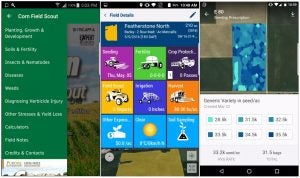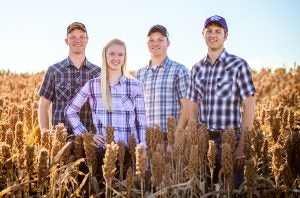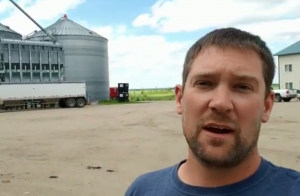Farm technology has advanced in recent years in ways that few people could have imagined a generation ago. Tractor circuitry is more precise yet also more complex, tablet and smartphone apps help us in optimizing our yields, and robots give us deep data on dairy. So it’s no surprise that a growing number of conferences and other gatherings are focused on the increasingly vital agtech sector.
I attended one such event, called Tech Hub LIVE, which was held at the Iowa Events Center in Des Moines. It was great to see hundreds of people in attendance, with some of them being production farmers.
But not every tech event draws these kinds of crowds.
And that’s a problem! For things like this to be effective, they need to reach the actual producers who make decisions on what to implement on their farms — agtech can’t just be shared with “ag professionals” with the hope that the farmers themselves will somehow get word of it through the grapevine.

So, what do we do to help make sure that farmers are the ones who learn from agtech events and who are gobbling up these new ways to make their operations more efficient, sustainable, and profitable?
One part of TechHub LIVE that I enjoyed was a segment called Tech Talks, which was basically an opportunity for trade show booth attendees to give 10-minute summaries of their businesses and what they do, with information on where their booths were located to learn more. One of my favorite TV shows is Shark Tank, and this was a fun format similar to that where businesses could give their pitch. I enjoy learning in a format that’s short and sweet — and many people have short attention spans, so it definitely appealed to that specific type of audience.
When you think about that — Shark Tank, that is — it appeals to the masses. It’s mainstream, fun, and celebrity filled! This is probably the best way to get the word out — incorporate influencers to help spread the word. Who are “celebrity type” influencers in agriculture? Probably the Peterson Farm Brothers, Millennial Farmer, Cole the Cornstar, and SharkFarmer, just to name a few. With combined millions of followers on YouTube, XM, podcasts, RFD-TV, and more, these guys are some of the big heavy hitters.

The theory behind “Tech Talks” has been around in agriculture for while. The Pearse Lyons Accelerator Program through the Alltech ONE conference has also been a popular event for technology to be showcased at agtech trade shows and is presented in a similar matter.
The incorporation of tech into agriculture is showing no signs of slowing down innovation anytime soon, fortunately! The #ONE conference also incorporates celebrities such as Bear Grylls as leading entrepreneurs and for entertainment, as well as finalists from popular television shows like America’s Got Talent.
It’s making agriculture cool. Celebrities bring a “wow factor” into tech, and even Elon Musk’s brother is big into indoor hydroponic farms. Celebrities have influence in food and farming whether we want to believe it or not and are often paid spokespeople for big food brands.
» Related: Farm Babe: Top 8 pro-science and pro-farmer celebrities
Wouldn’t it be great if Ag had a more mainstream image when it comes to technology for the general public? People generally love tech: the latest iPhone, Tesla, the Silicon Valley mentality. Agriculture deserves a seat at the table for urban areas.
So, we can do something similar in ag. Influencers are really an extension of brand advertising and often have sponsors. Millennial Farmer Zach Johnson reportedly makes more income on YouTube than he does as an actual farmer and has even been highlighted by YouTube themselves.

So with these millions of views, what big startup tech company wouldn’t want to be a part of getting the word out?
Farmers oftentimes look to see what their neighbors are doing. And nowadays with the rise of digital and tech, we have to be forward-thinking as an industry. Yes, we can physically see when our neighbors are trying something new, but what if we could now see that tech in action on YouTube? All of a sudden, we are raising more awareness on these tech conferences, which generate more buzz and attendance.
In addition to TechHub LIVE, other big agricultural trade shows that focus on tech include FarmTech Days and the Alltech ONE conference, the World Agri-Tech Innovation Summit and Agritechnica, Indoor Ag-Con, Ag Tech Expo and so many more! Really, there’s too many to list, especially when you get to the state or company level (thinking of AgTech Innovation Summit and AgTech NEXT 2021, just off the top of my head).
It’s exciting. And don’t get me wrong, bringing business professionals together in ag is always a great way to collaborate and gather brilliant minds together. But to do this, the messages must be amplified not only to the businesses themselves but to mainstream farmers audiences as well.
Every year on the farm is different but the industry always continues to overcome adversity, change, innovate, and continue to do more with less while using real time data. Farmers today are rapidly catching on to these new ideas, and must be in the know for their competitive advantage.
I’m sure more farmers will attend events like this in due time. Using TechHub LIVE as an example, this was the first time the organizers had ever done the conference. And the industry overall in ag is growing, so it certainly takes time to build excitement and bigger crowds. Their goal was to bring companies together to collaborate and “bring something fresh, new and exciting every year.”
I’m sure it will do just that, and I highly encourage others to seek attending this event and others in upcoming years. This ain’t your grandpa’s farm anymore. And “TECH”nically speaking, that’s a good thing!
Michelle Miller, the Farm Babe, is a farmer, public speaker and writer who has worked for years with row crops, beef cattle, and sheep. She believes education is key in bridging the gap between farmers and consumers.



